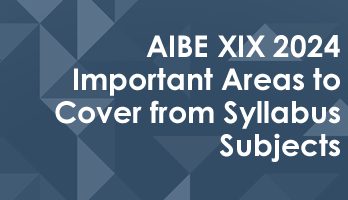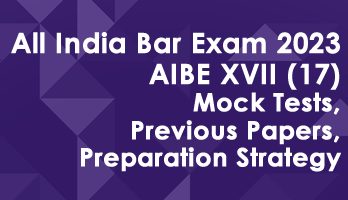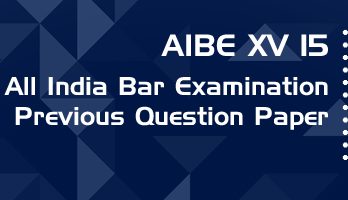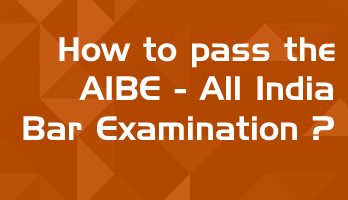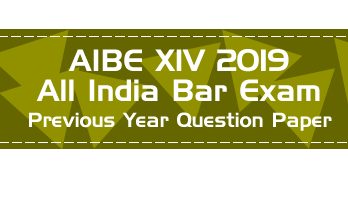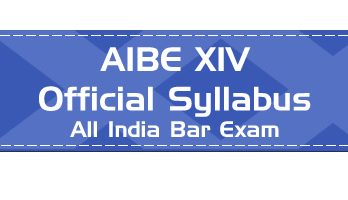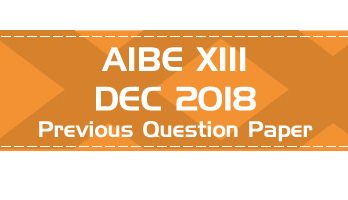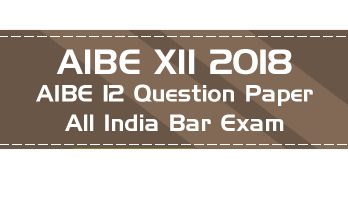This series consists of seven articles, which expand the complete syllabus for the AIBE – All India Bar Exam.
1. Constitutional Law, IPC, CrPC – Part 1
2. Code of Civil Procedure, Evidence Act, ADR – Part 2
3. Family Law, PIL, Administrative Law – Part 3
4. Professional Ethics, Company Law, Environmental Law – Part 4
5. Cyber Law, Labour & Industrial Law, Law of Torts – Part 5
6. Taxation Laws, Contract Law, Negotiable Instruments, Property Law – Part 6
7. Land Acquisition Act, Intellectual Property Laws – Part 7
- Updated as per the latest AIBE Syllabus & Pattern
- 15 AIBE Previous Question papers - AIBE IV to XVIII
- 15 Full-length mock tests as per latest pattern
- All Questions with Answers and Explanations
- Access valid for one year from date of purchase
- Accessible 24 x 7 via Smart-Phone, Tablets and Desktops
- Free Sample Mock Test - Try Before You Buy
Authentic Feedback from previous LawMint users :
I got AIR 21 in CLAT PG. Thank you so much. Your mocks helped me a lot in my preparation 🙂 - Ayushi Jain
I have subscribed to your CLAT PG program and got AIR 36 in this year CLAT PG. I have also secured AIR 54 in AILET PG exam. I would like to thank you. Your mock paper really helps a lot - Shrashank Tripathi
I would like to thank you for the CLAT PG LLM COURSE. Practising mock tests there helped me in getting confidence and hence I was able to get AIR 45 in CLAT PG LLM - Akshay Awasthi
A year back, I relied on the IIT Kharagpur RGSOIPL mock test series by LawMint to prepare for my RGSOIPL entrance test. Few months back, I relied on your UGC NET Law series to prepare for UGC NET. I was the topper of the RGSOIPL entrance, and have cracked JRF in UGC NET. All thanks to LawMint - Anshuman Sahoo
"I got AIR 18 in CLAT PG and General Category rank 28 in AILET PG. I want to thank you for helping me practice well in controlled conditions from any place. It gave me a lot of confidence and I took the tests while travelling too. I also made it to IIT Kharagpur." - Vinodharani
"Lawmint has been of great help to me in securing AIR 25 in AILET PG and AIR 29 in CLAT PG examinations. The subjective and objective approach of the test series kept me up to date with the latest exam pattern." - Bhawna Nanda
"I, Nimmy Saira Zachariah joined you clat test series. I cleared AILET PG with 30th rank. Your test series were of immense help as it gave me clear idea of where my preparations stand thank you once again law mint." - Nimmy S Z
"Hey guys. Where do I start? If I thought that getting AIR 59 in Clat PG was it, then how wrong I was. With Lawmint now I have cracked UGC NET as well." - Joyanta Chakraborty
C.P.C (Code of Civil Procedure) – 10 questions
CIVIL PROCEDURE CODE
Study of procedural law is important for a Law student. This course is designed to acquaint the students with the various stages through which a civil case passes through, and the connected matters. The course also includes law of limitation.
The course shall endeavour to familiarise the students with the case papers (like plaints, written statements, Interlocutory applications, etc.) involved in civil cases and touch upon the provisions of Evidence Act wherever necessary.
Topics Covered
Civil Procedure Code Introduction; Distinction between procedural law and substantive law- History of the code, extent and its application, definition; Suits: Jurisdiction of the civil courts- Kinds of jurisdiction-Bar on suits- Suits of civil nature (Sec.9); Doctrine of Res sub judice and Res judicata (Sec. 10, 11 and 12); Foreign Judgment (Sec. 13, 14); Place of Suits (Ss. 15 to 20); Transfer of Cases (Ss. 22 to 25).
Institution of suits and summons: (Sec. 26, 0.4 and Sec. 27, 28, 31 and O.5); Interest and Costs (Sec. 34, 35, 35A, B); Pleading: Fundamental rules of pleadings- Plaint and Written Statement- Return and rejection of plaint- Defences- Set off- Counter claim; Parties to the suit (O. 1): Joinder, misjoinder and non-joinder of parties- Misjoinder of causes of action- Multifariousness.
Appearance and examination of parties (O.9, O.18) – Discovery, inspection and production of documents (O.11 & O.13) – First hearing and framing of issues (O.10 and O.14) – Admission and affidavit (O.12 and O.19) – Adjournment (O.17) – Death, marriage-Insolvency of the parties (O.22) – Withdrawal and compromise of suits (O.23) – Judgment and Decree (O.20); Execution (Sec. 30 to 74, O.21): General principal of execution- Power of executing court- Transfer of decrees for execution- Mode of execution- a) Arrest and detention, b) Attachment, c) Sale.
Suits in particular cases; Suits by or against Governments (Sec. 79 to 82, O.27); Suits by aliens and by or against foreign rulers, ambassadors (Sec. 85 to 87); Suits relating to public matters (Sec. 91 to 93); Suits by or against firms (O.30); Suits by or against minors. and unsound persons (O.32); Suits by indigent persons (O.33); Inter-pleader suits (Sec. 88, O.35); Interim Orders; Commissions (Sec. 75, O.26); Arrest before judgment and attachments before judgment (O.38); Temporary injunctions (O.39); Appointment of receivers (O.40); Appeals (Ss. 90 to 109, O.41, 42, 43, 45); Reference- Review and Revision (Ss. 113, 114, 115, O.46, O.46); Caveat (Sec. 144.A)- Inherent powers of the court (Ss. 148, 149, 151).
Evidence Act – 8 questions
The law of Evidence has its own significance among Procedural Laws. The knowledge of law of Evidence is indispensable for a lawyer. The course is designed to acquaint the students with the rules of evidence in relation to relevancy of facts and proof.
In addition they are introduced to law relating to production of evidence. The course teacher shall familiarize the students with appreciation of evidence and use innovative techniques like simulation exercises wherever necessary.
Topics Covered :
Distinction between substantive and procedural law- Conceptions of evidence in classical Hindu and Islamic Jurisprudence- Evidence in customary law systems (Non-state law)- Introduction to the British ‘Principles of Evidence’- Legislations dealing with evidence (other than Indian Evidence Act) with special reference to CPC, Cr.P.C., Bankers Book Evidence Act, Commercial Document Evidence Act, Fiscal and revenue Laws- Salient features of the Indian Evidence Act, 1861, Applicability of the Indian Evidence Act.
Central Conceptions in Law of Evidence – Facts – Facts in issue and relevant facts- Evidence- Circumstantial and direct evidence- Presumptions, proved, disproved, not proved- Witness- Appreciation of evidence. Relevancy of Facts- Facts connected with facts in issue-Doctrine of Res gestae; Sections 6, 7, 8 and 9 of Evidence Act- Evidence of Common Intention-Section10, Relevancy or otherwise irrelevant facts- Facts to prove right or custom (Section13)-Facts concerning state of mind/state of body or bodily feelings (Sections 14 and 15) – Relevancy and admissibility of admissions, privileged admissions- evidentiary value of admissions (Sections 17 to 23).
Relevancy and admissibility of confessions- Admissibility of information received from an accused person in custody- Confession of co-accused (Sections 24 to 30) – Admitted facts need not be proved (Section 58); Dying declaration- Justification for relevance- Judicial standards for appreciation of evidentiary value-Section 32 (1) with reference to English Law -Other statements by persons who cannot be called as witnesses- (Sections 32(2) to (8), 33)- Statement under special, circumstances (Sections 34 to 39); Relevance of judgments- General principles – Fraud and collusion (Sections 40 to Sec. 44); Expert testimony: General principles (Sections 45-50) – Who is an expert- Types of expert evidence – Problems of judicial defence to expert testimony.
Character evidence- Meaning – Evidence in Civil Criminal cases; English Law (Sections 52-55)- Oral and documentary Evidence -Introduction on Proof of facts- General principles concerning oral; Evidence (Sections 59-60)- General principles concerning documentary; Evidence (Sections 61-90)- General principles regarding exclusion by evidence (Sections 91-100).
Burden of Proof- The general conception of onus probandi (Section 101)- General and special exception to onus probandi (Sections 102-106)- The justification of presumption and burden of proof (Sections 107 to 114) with special reference to presumption to legitimacy of child and presumption as to dowry death- Doctrine of judicial notice and presumptions. Estoppel: Scope of Estoppel – Introduction as to its rationale (Section 115)- Estoppel distinguished from Res judicata – Waiver and Presumption- Kinds of Estoppel- Equitable and Promissory Estoppel- Tenancy Estoppel (Section 116).
Witness, Examination and Cross Examination: Competence to testify (Sections 118 to 120)-Privileged communications (Sections 121 to 128)- General principles of examination and cross examination (Sections 135 to 166)- Leading questions (Sections 141- 145)- Approver’s testimony (Section 133)- Hostile witnesses (Section 154)- Compulsion to answer questions (Sections 147, 153)- Questions of corroboration(Sections 156-157)- Improper admission of evidence.
Alternative Dispute Redressal including Arbitration Act – 4 questions
Today alternative disputes resolution systems have become more relevant than before both at local, national and international levels. Certain of the disputes, by nature are fit to be resolved through specific method of resolution. Each of these dispute resolution systems involves different style of planning and execution. The skills involved are also different as also preparation. This course trains the students in ADRs. The course teacher shall administer simulation exercises for each of the methods.
Topics Covered :
Different methods of dispute resolution; Inquisitorial method; Adversarial method; Other methods- both formal and informal- like Arbitration, Conciliation, Negotiation, Mediation, etc.; Advantages and disadvantages of above methods; Need for ADRs; International commitments; Domestic needs; Suitability of ADRs to particular types of disputes; Civil Procedure Code and ADRs
Arbitration: Meaning of arbitration; Attributes of arbitration; General principles of arbitration; Different kinds of arbitration; Qualities and qualifications of an arbitrator; Arbitration agreement and its drafting; Appointment of arbitrator; Principal steps in arbitration; Arbitral award; Arbitration under Arbitration and Conciliation Act, 1996.
Conciliation: Meaning; Different kinds of conciliation- facilitative, evaluative, court- annexed, voluntary and compulsory; Qualities of a conciliator; Duties of a conciliator; Role of a conciliator; Stages of conciliation; Procedure; Conciliation under statutes- Industrial Disputes Act, 1947; Family Courts Act, 1984; Hindu Marriage Act, 1955; Arbitration and Conciliation Act, 1996.
Negotiation: Meaning; Different styles of negotiation; Different approaches to negotiation; Phases of negotiation; Qualities of a negotiator; Power to negotiate.
Mediation: Meaning; Qualities of mediator; Role of mediator; Essential characteristics of the mediation process – voluntary, collaborative, controlled, confidential, informal, impartial & neutral, self-responsible; Different models of mediation; Code of conduct for mediators.
This series consists of seven articles, which expand the complete syllabus for the AIBE – All India Bar Exam.
1. Constitutional Law, IPC, CrPC – Part 1
2. Code of Civil Procedure, Evidence Act, ADR – Part 2
3. Family Law, PIL, Administrative Law – Part 3
4. Professional Ethics, Company Law, Environmental Law – Part 4
5. Cyber Law, Labour & Industrial Law, Law of Torts – Part 5
6. Taxation Laws, Contract Law, Negotiable Instruments, Property Law – Part 6
7. Land Acquisition Act, Intellectual Property Laws – Part 7
Note : Always refer to the current year’s official advertisement for the latest topics and number of questions.
- Updated as per the latest AIBE Syllabus & Pattern
- 15 AIBE Previous Question papers - AIBE IV to XVIII
- 15 Full-length mock tests as per latest pattern
- All Questions with Answers and Explanations
- Access valid for one year from date of purchase
- Accessible 24 x 7 via Smart-Phone, Tablets and Desktops
- Free Sample Mock Test - Try Before You Buy
Authentic Feedback from previous LawMint users :
I got AIR 21 in CLAT PG. Thank you so much. Your mocks helped me a lot in my preparation 🙂 - Ayushi Jain
I have subscribed to your CLAT PG program and got AIR 36 in this year CLAT PG. I have also secured AIR 54 in AILET PG exam. I would like to thank you. Your mock paper really helps a lot - Shrashank Tripathi
I would like to thank you for the CLAT PG LLM COURSE. Practising mock tests there helped me in getting confidence and hence I was able to get AIR 45 in CLAT PG LLM - Akshay Awasthi
A year back, I relied on the IIT Kharagpur RGSOIPL mock test series by LawMint to prepare for my RGSOIPL entrance test. Few months back, I relied on your UGC NET Law series to prepare for UGC NET. I was the topper of the RGSOIPL entrance, and have cracked JRF in UGC NET. All thanks to LawMint - Anshuman Sahoo
"I got AIR 18 in CLAT PG and General Category rank 28 in AILET PG. I want to thank you for helping me practice well in controlled conditions from any place. It gave me a lot of confidence and I took the tests while travelling too. I also made it to IIT Kharagpur." - Vinodharani
"Lawmint has been of great help to me in securing AIR 25 in AILET PG and AIR 29 in CLAT PG examinations. The subjective and objective approach of the test series kept me up to date with the latest exam pattern." - Bhawna Nanda
"I, Nimmy Saira Zachariah joined you clat test series. I cleared AILET PG with 30th rank. Your test series were of immense help as it gave me clear idea of where my preparations stand thank you once again law mint." - Nimmy S Z
"Hey guys. Where do I start? If I thought that getting AIR 59 in Clat PG was it, then how wrong I was. With Lawmint now I have cracked UGC NET as well." - Joyanta Chakraborty


